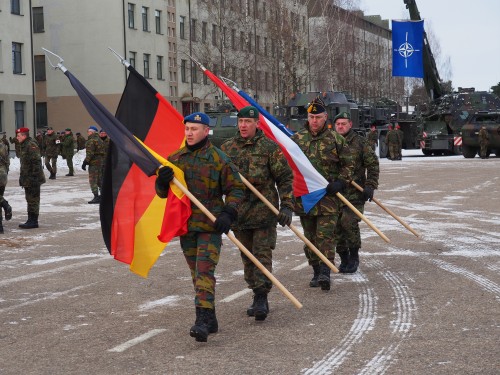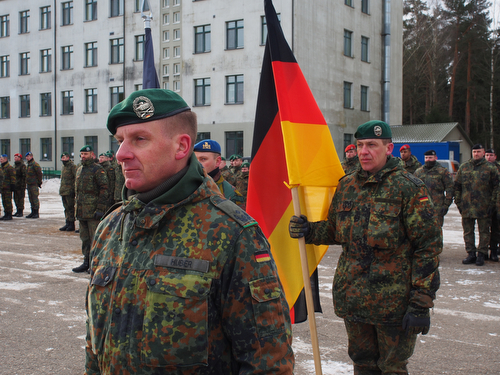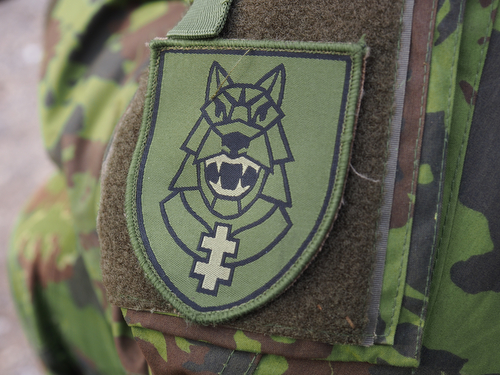Offizieller Start für erste NATO-Battlegroup im Nordosten (Nachtrag: Rede v.d.Leyen)
In Rukla in Litauen ist am (heutigen) Dienstag offiziell der Startschuss für die erste NATO-Battlegroup an der Grenze des Bündnisses zu Russland gefallen. Die litauische Staatspräsidentin Dalia Grybauskaité begrüßte die Soldaten aus Deutschland, Belgien und den Niederlanden, die den Kern der enhanced Forward Presence (EFP), der verstärkten vorgeschobenen Präsenz des Bündnisses im Nordosten des Allianzgebietes bilden.
Die NATO hatte auf ihrem Gipfel im Juli vergangenen Jahres beschlossen, eine sichtbare Präsenz in den drei baltischen Staaten und Polen aufzubauen und damit der Abschreckung gegen Russland zusätzliches Gewicht zu verleihen. Das verstärkte Bataillon in Litauen wird von Deutschland geführt; den Kern bildet zunäst das Panzergrenadierbataillon 122 aus Oberviechtach. Insgesamt sollen rund 450 deutsche Soldaten für ein halbes Jahr in Rukla Dienst tun und gemeinsam mit den Litauern und den anderen beteiligten Verbündeten üben, ehe sie durch andere Einheiten aus Deutschland ausgetauscht werden.
Verteidigungsministerin Ursula von der Leyen erinnerte bei der Zeremonie an die wechselvolle deutsch-litauische Geschichte, zu der der Hitler-Stalin-Pakt mit seinen Folgen für das Land ebenso wie die Besetzung durch die Wehrmacht gehöre. Litauen wird nie wieder allein dastehen, bekräftigte die deutsche Politikerin. Das Land sei so stark wie die gemeinsame Macht aller 28 NATO-Mitglieder
Das Pressegespräch mit Grybauskaité und von der Leyen zum Nachhören (die litauischen Übersetzungen bzw. Fragen und Antworten nur auf Litauisch ohne Übersetzung habe ich rausgenommen und das mit einem Signalton kenntlich gemacht). Interessant sind die Aussagen der litauischen Präsidentin zu Russland wie zu den USA – und von der Leyens Aussagen zum großen transatlantischen Verbündeten:
Das verstärkte Bataillon unter Führung des deutschen Oberstleutnants Christoph Huber (im Bild unten) ist noch im Aufbau; bis zum Mai soll es komplett sein, wenn als letzte beteiligte Nation für die aktuelle Rotation der EFP-Battlegroup die Norweger hinzusstoßen. Das Bataillon soll dann über 16 Kampfpanzer (davon sechs deutsche) und 36 Schützenpanzer (davon 20 Marder der Bundeswehr) verfügen. Ausgestattet ist der Verband auch mit scharfer Munition, was schon deutlich machen soll, dass trotz der Übungsvorhaben gemeinsam mit den Litauern diese Einheit auch kampffähig ist.
Der deutsche Kommandeur und damit die ganze Battlegroup ist direkt der litauschen Eisenwolf-Brigade unterstellt (deren Abzeichen s. unten). Die wiederum soll einem polnischen Hauptquartier unterstellt werden – die ganze Struktur der EFP-Einheiten, so höre ich, ist bislang noch nicht so endgültig festgelegt. Unter anderem ist noch in der Abstimmung, welche direkte oder eben nicht so direkte Kontrolle die NATO via ihr Joint Forces Headquarters in Brunssum hat.
Nachtrag 8. Februar: Das BMVg hat eine Abschrift der Rede der Ministerin bei dieser Begrüßung veröffentlicht:
Next year, You, the freedom-loving people of this proud country, will celebrate the centenary of your independence in modern times. Yet, from the very beginning, your freedom had been under threat.
Lithuania stood alone against powerful neighbours who showed no respect for international law, the right to self-determination of the people and the independence of the young European democracies. In the Hitler-Stalin Pact, Nazi- Germany and the Stalinist Soviet Union divided Europe between themselves.
After less than 20 years, the freedom of Poland, Estonia, Latvia and also Lithuania
ended with the stroke of a pen. What followed in 1940 was the nightmare of Soviet occupation:
mass arrests, countless executions and the deportation of tens of thousands of people.
But there was even worse to come:
The Wehrmacht’s invasion brought many years of misery and destruction to Lithuania. The country fell victim to the Nazi dictatorship. In the Nazi’s plans, there was no room for a Lithuanian nation.
Then, the end of World War II and the Allies‘ victory didn’t bring the hoped-for freedom either. Quite the contrary: Once again, the country suffered from oppression and the terror of the Stalinist era. For another 45 years, the Lithuanian people were forced to live without freedom – but they never gave in.
I vividly recall the first images of the Singing Revolution back in 1990, the dramatic footage of the uneven fight on Bloody Sunday in Vilnius, almost exactly 26 years ago. Back then, the courage of the people defeated a seemingly invincible opponent.
Since it became independent,
Lithuania has been a success story, admired by all Europeans: It became part of the indivisible Europe of democracy and freedom. It is a respected member state of the EU and NATO. Lithuania boasts a vibrant democracy with a liberal, open society. And it is a country
which dared to leap into the 21st century very early and today is one of the leading countries when it comes to internet access.
Today, we have come together as NATO partners to reassure our strong commitment to the future of Lithuania: Never again will Lithuania stand alone. The future of its people is protected by the greatest military alliance of our times. Soldiers from Belgium, the Netherlands, Norway, Luxemburg and Germany will stand side by side with our American friends to defend your borders. France and Croatia will join in, too.
Today, Lithuania is as strong as the combined power of all 28 NATO member states. Never again will the freedom and the independence of Lithuania be sacrificed. All allies of Lithuania honor their Alliance commitments, without compromise. We stand united, so that the people of Lithuania can live without fear and shape their future as they like.
Ladies and Gentlemen, As German Minister of Defence I was touched to hear how friendly you welcomed the Bundeswehr soldiers here in Lithuania. Such open arms! We certainly did not take this for granted, since a great share of the historical responsibility for the misery and hardship Lithuania had to endure in the 20th century falls upon Germany. This is why we are infinitely grateful. And we are proud to lead this Battlegroup. It is a symbol of great trust in the German armed forces, our Bundeswehr.
During the Cold War, the Federal Republic of Germany enjoyed the protection of its allies. For this we are grateful and now want to give some of it back. To our partners who now need the Alliance’s solidarity and protection. We are happy to oblige and do so wholeheartedly. Because the history of Europe in the 20th century teaches us a lesson: Freedom and security are not a given. We will only be able to defend our democracies successfully if we stand together.
And this is exactly what we are doing here today – together, under NATO’s blue flag.
Den Bericht des litauischen Verteidigungsministeriums dazu gibt es hier.
Fürs Archiv: Nachtrag 9. Februar: Eine Reaktion aus Moskau:
Russia views the deployment of NATO troops and military hardware to the Baltic states, Poland and Germany as a threat, Russia’s state-run RIA news agency reported on Thursday.
RIA cited Russian Deputy Foreign Minister Alexei Meshkov as saying Moscow was watching closely and would ensure that its own security was guaranteed.
„This deployment is of course a threat for us,“ RIA cited Meshkov as saying. „And who said that it will end with this? We do not have such information. For the first time since World War II we see German soldiers along our borders.“
… und auch diese Reuters-Meldung fürs Archiv:
The Baltic states will press the United States and NATO to take additional security measures in the region ahead of a large Russian military exercise planned for September, Lithuania’s president said on Thursday. (…)
„We see that risks are increasing, and we are worried about the upcoming ‚Zapad 2017‘ exercise, which will deploy a very large and aggressive force (on our borders) that will very demonstrably be preparing for a war with the West,“ Lithuanian President Dalia Grybauskaite told reporters after talks with her counterparts from Latvia and Estonia in Riga.
„This means that we will be talking with NATO about creating additional standing defense plans, about stationing additional military means and about creating a faster decision- making process“, she said.






„….Besetzung durch die Wehrmacht “
naja, die baltischen Staaten haben das damals, und in signifikanten teilen der Bevölkerung bis heute, aber nicht unbedingt als „Besetzung“ interpretiert.
Immer amüsant wenn zwei so unterschiedliche Geschichtsexegesen aufeinandertreffen.
@wacaffe
Stimmt, aber was soll Sie öffentlich darstellen? Etwa „Befreiung der baltischen Staaten“ infolge der Umsetzung des deutsch-sowjetischen Nichtangriffspakt, später Freundschaftsvertrages von 1939?
Die Annexionen der baltischen Staaten standen im Zusammenhang mit der großen Westerweiterung der Sowjetunion, die aber erst NAZI-Deutschland ermöglichte.
1941 wurde das Gebiet von Truppen der deutschen Wehrmacht besetzt. Zig-tausende Freiwillige, meldeten sich für den Dienst in der 15., 19. oder 20. Waffen-Grenadier-Division der SS. Ein anderer Teil der Bevölkerung kämpfte allerdings auch auf Seiten der Roten Armee gegen die deutsche Besatzung.
Infolge der erneuten Besetzung 1944 durch die Rote Armee flohen nicht wenige Balten nach Westen.
Insgesamt eine diffizile Historie, die UvdL im Detail selbstverständlich kaum im Sinne von „die Wehrmacht hat Euch befreit“ darstellen kann. Eine Exegese durch die Ministerin möchte ich ebenfalls kaum unterstellen, sie wird die komplexen Abläufe kennen und wissen was ablief. Die Einladung seitens Grybauskaite an die deutsche Seite spricht für sich.
Die insgesamt 77 Belgier der BGLTU (BEL Soldat vorn auf dem Foto) des LogBtl 18 wurden mit einem A400M der (DEU) Luftwaffe eingeflogen (BEL Melsbroek > LIT Palanga) und übernahmen im Hafen von Klaipeda (Memel) ihre Fahrzeuge am 27.01.17. Stationiert sind die Belgier, wie die Masse eFP/Litauen, in Rukla.
Die BEL Logistiker werden Ende Mai durch LogBtl 29 abgelöst werden; damit wird deutlich, Belgien handhabt eine 4-Monats-Rotation. Der Rotationsrhythmus war ja bereits im vorhergehenden Faden Thema. (U.S.-Army 9 Monate, Deutsches Heer 6 Monate).
http://m.mil.be/nl/artikel/bgltu-gros-logistieke-steun-naar-litouwen-vertrokken
UvdL in Litauen und die A400M will (kann) nicht mehr, Triebwerksausfall?
https://www.dbwv.de/dbwv-info-portal/politik-verband/beitrag/news/litauen-feiert-ankunft-der-nato-soldaten-a400m-streikt/
Ihre Rückreise, auch die von @T.W.(?) verlief denn auch außerplanmäßig. Gleich bei der ersten Dienstreise von der Leyens mit einem modernen A400M-Transportflugzeug versagte die Maschine ihren Dienst.
Weiter mit -1oder 2 – Transall?
Hoffe, das die Truppe sich nicht wieder alle Ausrüstung zusammenleihen musste. Wenigstens für 450 Soldaten sollte es doch zu schaffen sein.
@all
Der Eintrag ist jetzt aktualisiert, u.a. mit Audio des Pressegesprächs der litauischen Präsidentin und der deutschen Verteidigungsministerin.
(und eine Bitte: Zu A400M mache ich einen neuen Eintrag; hier bitte nicht dazu kommentieren, wenn überhaupt dann im vorangegangenen Eintrag zu diesem Thema. Danke. T.W.]
@T.Wiegold: Wer stellt denn die anderen 10 Kampfpanzer? Norwegen? Denn Belgien hat keine Kampfpanzer mehr und die Niederlande werden kaum 10 Stück an Leo II im Moment aufbieten können aus dem Panzerbataillon 414 mit Deutschland zusammen.
Weil die Geschichte des WK II – das Balten auf deutscher wie auf sowjetischer Seite gekämpft haben – thematisiert wurde, eine Filmempfehlung: „Brüder-Feinde“
A400M: Vielleicht waren minus 15 Grad schon zuviel für die schwachbrüstige Mühle.
Die angetretenen Soldaten haben erkennbar gefroren.
Litauisches TV zeigte Ministerin, die ipad mässig Symbole auf einem Bildschirm in einem Gefechtsstand drückt, um der LTU Präsidentin was zu zeigen. Peinlich.
Ob das Ganze jetzt schon nötig war? Immerhin ist der Verband noch lange nicht komplett. Offenbar hat die Symbolik alles übersteuert. Schade.
@LTC007
Zu A400M gibt’s einen eigenen Thread.
Und der Termin kam offensichtlich auf Wunsch der litauischen Präsidentin zustande…
@closius
Bällebad: Klaus-Peter Kaikowsky | 06. Februar 2017 – 18:57
Alles von 414!
BISON DRWASKO aus Sicht des NLD Heeres, mit SP der (neu aufzubauenden) NLD PzTr, hier DEU/NLD PzBtl 414 aus BERGEN/OERBKE.
Einige aufschlussreiche Details zum Stand bei 414, soweit sie sich aus dem Bericht ergeben.
– Seitens sind des einzigen gemischten DEU / NLD Kampftruppenbataillons nehmen 13 KPz teil.
– Davon ein reiner NLD Zug, Rest deutsche Besatzungen.
– Der II. NLD Zug befindet sich derzeit in Aufstellung, III./- und IV./- folgen anschließend
https://www.defensie.nl/actueel/nieuws/2017/02/03/rhino-drawsko-leopards-terug-ter-bescherming-van-de-troepen
Video zeigt Sequenzen mit DEU/NLD Leo 2A6, POL Leo 2 A4 und NLD CV 90/35 des NLD PzGrenBtl (PainfBat) 45.
Bericht hebt abschließend die Integration von 414 zur „43 (NLD) Gemechaniseerde Brigade“ und deren Zugehörigkeit zur 1. PzDiv hervor.
@closius
Fehler von mir, Verwechselung eFP mit Bison Drawsko.
Die fehlenden KPz kommen (?) vom Telemark-Btl. Quelle erinnere ich aktuell nicht, hoffe aber einer der deutschen Mitleser aus dem Baltikum/Polen kann zur Aufhellung beitragen.
Alternativ bliebe nämlich nur noch Kroatien, dann allerdings mit M-84 A1-A4 (Basis T-72 A), da die weiteren TCN bei 122 KPz nicht nutzen, 414 bleibt in Polen gebunden.
„Unter anderem ist noch in der Abstimmung, welche direkte oder eben nicht so direkte Kontrolle die NATO via ihr Joint Forces Headquarters in Brunssum hat.“
Na dann prüft mal schön…
In Moskau wird man schon ganz abgeschreckt sein, ob der Entschluss- und Schlagkraft der NATO.
@Memoria
Na, die Schlagkraft schreckt nicht ab, aber ob Russland mit seinen Angriffen im Baltikum/Osteuropa nun so weitermacht wie in der Vergangenheit ist zu bezweifeln. Wie wäre die Entwicklung in Osteuropa verlaufen, wenn die NATO nicht reagiert hätte?
Habe mal ein paar weitere Bilder aus Rukla hochgeladen:
https://www.flickr.com/photos/wiegold/albums/72157680079173525
@KPK & Closius
Norwegens Telemark Bataillon stellt 8 Panzer Leopard2A4. Sagt zumindest dieses nett gemachte Video aus dem NATO-PR-Shop.
https://www.youtube.com/watch?v=k3IPA3rxpuE
„Schlagkreft“ ? Schätze mal, dass man für so eine multinationale Battlegroup inkl. scharfer Logistik mindestens 6 Monate braucht, um sie „ernsthaft“ in den Status Combat Ready zu versetzen…..und dann lösen wir sie auf und fangen von Vorne an. Battlegroup Sisyphos wäre ein guter Name ;-)
@Memoria | 08. Februar 2017 – 2:13
„… welche direkte oder eben nicht so direkte Kontrolle die NATO via ihr Joint Forces Headquarters in Brunssum hat“.
Der Satz ist mir auch unangenehm aufgestoßen, zum einen, was wurde eigentlich in knapp 12 Monaten Vorbereitung bis zur endgültigen Realisierung (Warschauer NATO-Gipfel in 07/16) zu eFP zwischen Brüssel und Brunssum die Operationsführung betreffend entschieden, wenn die Zuständigkeiten „fünf vor Zwölf“ immer noch nicht klar geregelt sind?
Zum anderen, was geht das JFC Brunssum „direkte Kontrolle“ an?
Die Krux von Truppenführung unter digitalen Bedingungen ist die Möglichkeit des Durchgreifens eines Kommandierenden Generals bis in die Zugebene, gut? NEIN, mies, schlecht, Befehlstaktik, erfolglos! Die Selbständigkeit unterstellter Führung ergibt sich in Folge ihrer Unabhängigkeit auf Basis bestehender Aufträge.
Auftragstaktik ~ Mission Command!
Oder auch der wesentliche Unterschied von OPERATIONAL COMMAND (OPCOM) und OPERATIONAL CONTROL (OPCON). Das was jahrzehntelang als Mantra eingebläut wurde, soll jetzt außer Kraft gesetzt werden?
Warum?
Doch wohl nur, weil Befürchtungen bestehen, eFP im Fokus stehend, gerät sicherheitspolitisch und ff medial außer Kontrolle! Um die Öffentlichkeit ruhig zu halten bedarf es keines operativen Durchgreifens, dadurch werden unterstellte Führer entmündigt.
Pressezuständigkeit in Brunssum und politische Leitung in Brüssel, zu eFP als Ganzes! Und Berlin wird sich hoffentlich auch zum GefVbd 122 in bewährter Praxis bei BPK nebulös bescheiden, zumindest dass wird gekonnt, wie beruhigend.
Und Putin, der muss nicht beruhigt werden, bei insgesamt vier Gefechtsverbänden!
@Klaus-Peter Kaikowsky
Tja, das ist eben das historische Dilemma: da die NATO keinen GDP mehr hat, gibt es eben keinen Art5-Command Forces mehr, es fehlen dazu alle rechtlichen Grundlagen. Diese Battlegroup hat eine politische Stolperdraht-Funktion und keinerlei militärische….also ist die mlitärische Kontrolle über diese BG eine nachrangige Frage gegenwärtig. USA wird natürlich darauf bestehen, dass die OPCON über diese BG im Fall der Fälle an SACEUR übertragen wird, und der entscheidet dann über Delegation an z.Bsp. Brunssum. Die NATO erfindet gerade die GDP-Planung neu……das kann dauern ;-)
@Klabautermann
GDP, exakt. Back to the roots. War in einem der Vorgängerfäden bereits am Rande Thema.
SACEUR in lead, mit DEU COS sowieso.
Aber dann? Wieso JFC Brunssum, wo NATO sich doch in STETTIN das http://mncne.pl leistet, mit pol/mil/geo-Kompetenz aus „vor-Ort-Sicht“? Subsidiaritätsprinzip war bei HeeresOps stehts von Vorteil!
„The Headquarters Multinational Corps Northeast has been changing its structure in order to become a High Readiness Forces (HRF) Headquarters“! – Let’s go -!
Oder wird das Problem die bestehende „Command Structure“ sein können?
Erster Angelsachse DCOS OPS, kann ja nicht laufen(?), mit Framework Nations – Denmark, Germany and Poland!
Andererseits hab ich persönlich erlebt, wie mein (US) DCOS OPS den COS (DEU) regelmäßig zum Frühstückdirektor beförderte. DCOS hieß „damals“ aber auch David Patraeus, in Sarajevo.
@ KPK:
Wenn ein Muttersprachler auf einen Nicht-Muttersprachler trifft, ist das Ergebnis des Wortgefechtes schon vorprogrammiert…
Interessant ist übrigens folgendes: Eine zeitlang wurde mit viel Aufwand das Konzept „JTF (L)“ betrieben, soll heißen, die Korpsstäbe sollten drei Rollen ausführen können:
1. Als Korpsstab unter LCC
2. Als LCC unter JFC B oder N
3. Als JTF (L) in einer „land-heavy operation“
Insofern ist die Frage durchaus berechtigt, wieso da nicht das MNC NE „in lead“ ist…
@Hans Dampf
BTW, nach Brexit, keine Muttersprachler in EU, und jetzt. [OT, ok].
Ich bezog mich ja auf Ihr Beispiel (US) DCOS OPS vs. COS (DEU). Einen US-Amerikaner zähle ich auch zu einem Muttersprachler der englischen Sprache ;-).
Und hier die gesuchten NOR 2A4 des Telemark-Btl für GefVbd 122 in Litauen.
@RoyalTankRegt
Snow Leopard – See our Norwegian Tankie friends gearing up for their #NATO deployment to Lithuania | (link: http://bit.ly/2kHz3RQ) bit.ly/2kHz3RQ
Nachdenklicher UK-Kommentar:
Breadfan @sttrory
@RoyalTankRegt maybe we should buy 200 to replace the 200 scrapped challenger 2?
Die Bilder geben leider nicht zweifelsfrei her, ob die Norweger mit Greifern fahren.